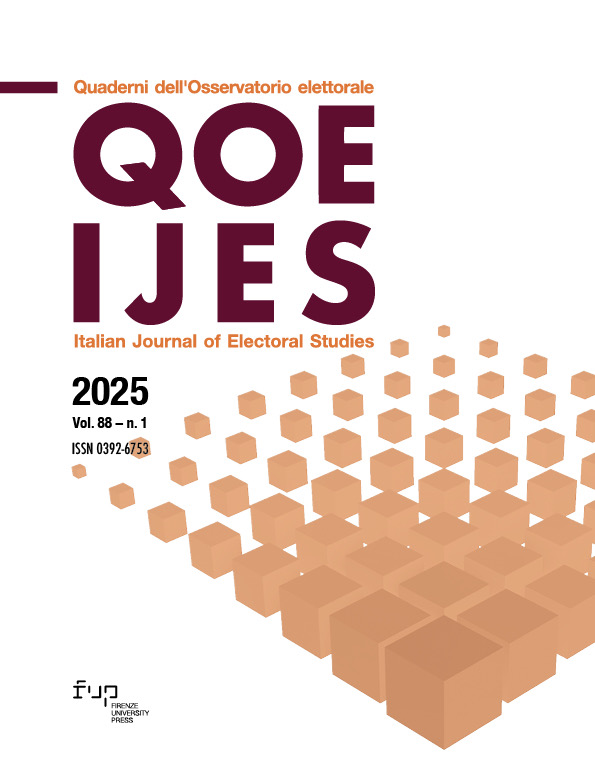A new normal? The EP elections 2024 amidst old and new challenges. Special issue introduction

Pubblicato 2025-10-30
Parole chiave
- 2024 EP Elections,
- EU Party Competition,
- EU Voting Determinants
Come citare
Copyright (c) 2025 Davide Angelucci; Kaat Smets

TQuesto lavoro è fornito con la licenza Creative Commons Attribuzione 4.0 Internazionale.
Abstract
The special issue addresses whether recent electoral dynamics characterised by high levels of disengagement, a more polarized conflict, and the establishment of challenger parties as (potentially) governing parties, should be no longer seen as exceptional in themselves, but rather as symptomatic of a political competition that is in fact representing a ‘new normal’. It focuses on the European Parliament elections 2024. These elections have provided us with an important opportunity to assess whether these dynamics will structure electoral competition also in the European arena as should be the case according to the second order model which predicts that EU elections are seen as less important than national elections by voters, parties and the media; and that the EU electoral arena is influenced by national party competition (Reif and Schmitt 1980). Or, contrary to the second order model, whether European elections will be played on a different playground compared to national elections. To this end, the special issue presents comparative contributions (but also case studies of particular relevance) capable of clarifying how the competition between parties is structured and which factors have influenced voters’ choices at the ballot box.
Riferimenti bibliografici
- Braun D. (2021). The Europeanness of the 2019 EP elections and the mobilizing power of European issues. Politics, 41(4), 451-466.
- Carteny, G., Braun, D., Hartland A., & Reinl, A. K. (2025). Party competition on European issues in the 2024 EP elections. Italian Journal of Electoral Studies, Just Accepted. https://doi.org/10.36253/qoe-17373
- Carrieri L., Conti N. & Giardiello M. (2025). EU issue voting in the 2024 European elections in Italy: Is the sleeping giant awake? Italian Journal of Electoral Studies, Just Accepted. https://doi.org/10.36253/qoe-17384
- Carrieri L., Conti N. & Loveless M. (2024). EU Issue Voting in European Member States: The Return of the Pro-EU Stance and Pro-EU Voter. West European Politics, 48(3), 479–506.
- Castaldo, A., Di Mauro, D., & Memoli, V. (2025). Populism and affective polarization in the times of “Giorgia”: an assessment of the effect on European voting. Italian Journal of Electoral Studies, Just Accepted. https://doi.org/10.36253/qoe-17355
- Downs, A. (1956). An economic theory of democracy. Harper.
- Improta M., & Mannoni, E. (2025). Keeping the left alive: exploring voter support for the Greens and Left Alliance (AVS) in the 2024 European elections. Italian Journal of Electoral Studies, Just Accepted. https://doi.org/10.36253/qoe-17432
- Okolikj M., & Lewis-Beck, M. (2025). Economic matters: the 2024 European Parliament elections. Italian Journal of Electoral Studies, Just Accepted. https://doi.org/10.36253/qoe-17327
- Reif, K., & Schmitt, H. (1980). Nine second‐order national elections – a conceptual framework for the analysis of European Election results. European Journal of Political Research, 8(1), 3-44.

